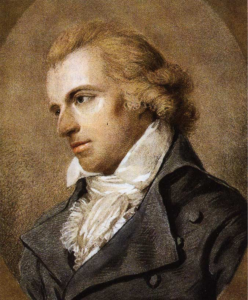Thekla (the voice of a spirit)
(Poet's title: Thekla (eine Geisterstimme))
Set by Schubert:
D 73
[August 23, 1813]
D 595
[November 1817]
Wo ich sei und wo mich hingewendet,
Als mein flücht’ger Schatte dir entschwebt?
Hab ich nicht beschlossen und geendet,
Hab ich nicht geliebet und gelebt?
Willst du nach den Nachtigallen fragen,
Die mit seelenvoller Melodie
Dich entzückten in des Lenzes Tagen,
Nur so lang sie liebten, waren sie.
Ob ich den Verlorenen gefunden?
Glaube mir, ich bin mit ihm vereint,
Wo sich nicht mehr trennt, was sich verbunden,
Dort wo keine Träne wird geweint.
Dorten wirst auch du uns wieder finden,
Wenn dein Lieben unserm Lieben gleicht,
Dort ist auch der Vater frei von Sünden,
Den der blut’ge Mord nicht mehr erreicht.
Und er fühlt, dass ihn kein Wahn betrogen,
Als er aufwärts zu den Sternen sah,
Denn wie jeder wägt, wird ihm gewogen,
Wer es glaubt, dem ist das Heil’ge nah.
Wort gehalten wird in jenen Räumen
Jedem schönen, gläubigen Gefühl,
Wage du zu irren und zu träumen,
Hoher Sinn liegt oft in kind’schem Spiel.
You ask where I am and where I went
When my fleeting shade disappeared.
Have I not concluded and come to an end,
Have I not loved and lived?
Do you want to ask about the nightingales
Who, with soulful melody,
Delighted you in the days of spring?
As long as they loved, they existed.
Did I find him who was lost?
Believe me, I am united with him,
There where there is no parting of those who are bound together,
There, where no tears are shed.
That is where you too will find us again,
If your love is like our love;
My father is there too, free of sin,
Where bloody murder can no longer reach him.
And he feels that he was not misled by any delusion
When he looked up to the stars,
For as he judges so is he judged.
To those who believe this, the sacred is close.
In those spaces there will be fulfilment of
Each beautiful, faithful feeling.
Dare to stray and to dream.
There is often a high meaning in childish play.
All translations into English that appear on this website, unless otherwise stated, are by Malcolm Wren. You are free to use them on condition that you acknowledge Malcolm Wren as the translator and schubertsong.uk as the source. Unless otherwise stated, the comments and essays that appear after the texts and translations are by Malcolm Wren and are © Copyright.
☙
Themes and images in this text:
Detours and delusions Dreams Father and child Fleeting (flüchtig) Games and play Ghosts and spirits High, low and deep Nightingales, Philomel Shade and shadows Spring (season) Stars Tears and crying
This is a voice from ‘beyond’ the grave. ‘Behind’ the veil of mortality Thekla assures us that now that she has passed ‘over’ and all is well. Like her father, we have to see ‘through’ the illusion that deludes. What looked like play (actually it was a trilogy of plays about Wallenstein) is, in fact, something with a ‘high’ meaning.
It doesn’t quite work in English, where we look for ‘deep’ rather than ‘high’ meanings. Perhaps the idea of being ‘high-minded’ catches something of Schiller’s intention (since ‘Sinn’ could refer to ‘reason’, ‘purpose’ or ‘intention’ as much as ‘meaning’). However, both German and English share the use of prepositions and adjectives of location to serve as metaphors for conditions that are outside of time and space.
The first word of the text (Wo? Where?) raises the question on a number of levels. Where is she? Where did she go? These are reasonable questions for any audience member or reader to ask at the end of the Wallenstein trilogy, but Schiller makes Thekla challenge the interlocutor’s demand for clear coordinates. She answers with a question. Why don’t you ask the nightingales why they stopped singing at the end of spring? You want to know if I am ‘with’ my lover (Max Piccolomini)?
She admits that they are now united, but ‘dort’ (there), not ‘here’. You will find us ‘there’ if you can love like us. Her murdered father (Albrecht von Wallenstein) is also ‘there’, in a place where murder cannot reach him. Looking up (aufwärts) allowed him to escape the delusions of life. We too, then, must be high minded and transcend the here and now. The voice from up there never talks about being down here.
☙
Original Spelling Thekla. Eine Geisterstimme Wo ich sey, und wo mich hingewendet, Als mein flücht'ger Schatte dir entschwebt? Hab' ich nicht beschlossen und geendet, Hab' ich nicht geliebet und gelebt? Willst du nach den Nachtigallen fragen, Die mit seelenvoller Melodie Dich entzückten in des Lenzes Tagen? Nur so lang sie liebten, waren sie. Ob ich den Verlorenen gefunden? Glaube mir, ich bin mit ihm vereint, Wo sich nicht mehr trennt, was sich verbunden, Dort wo keine Thräne wird geweint. Dorten wirst auch du uns wieder finden, Wenn dein Lieben unserm Lieben gleicht, Dort ist auch der Vater frey von Sünden, Den der blut'ge Mord nicht mehr erreicht. Und er fühlt, daß ihn kein Wahn betrogen, Als er aufwärts zu den Sternen sah, Denn wie jeder wägt, wird ihm gewogen, Wer es glaubt, dem ist das Heil'ge nah. Wort gehalten wird in jenen Räumen Jedem schönen, gläubigen Gefühl, Wage du, zu irren und zu träumen, Hoher Sinn liegt oft in kind'schem Spiel.
Confirmed by Peter Rastl with Gedichte von Friederich Schiller, Zweiter Theil, Zweite, verbesserte und vermehrte Auflage, Leipzig, 1805, bei Siegfried Lebrecht Crusius, pages 31-32.
To see an early edition of the text, go to page 27 [33 von 310] here: http://digital.onb.ac.at/OnbViewer/viewer.faces?doc=ABO_%2BZ207858305


